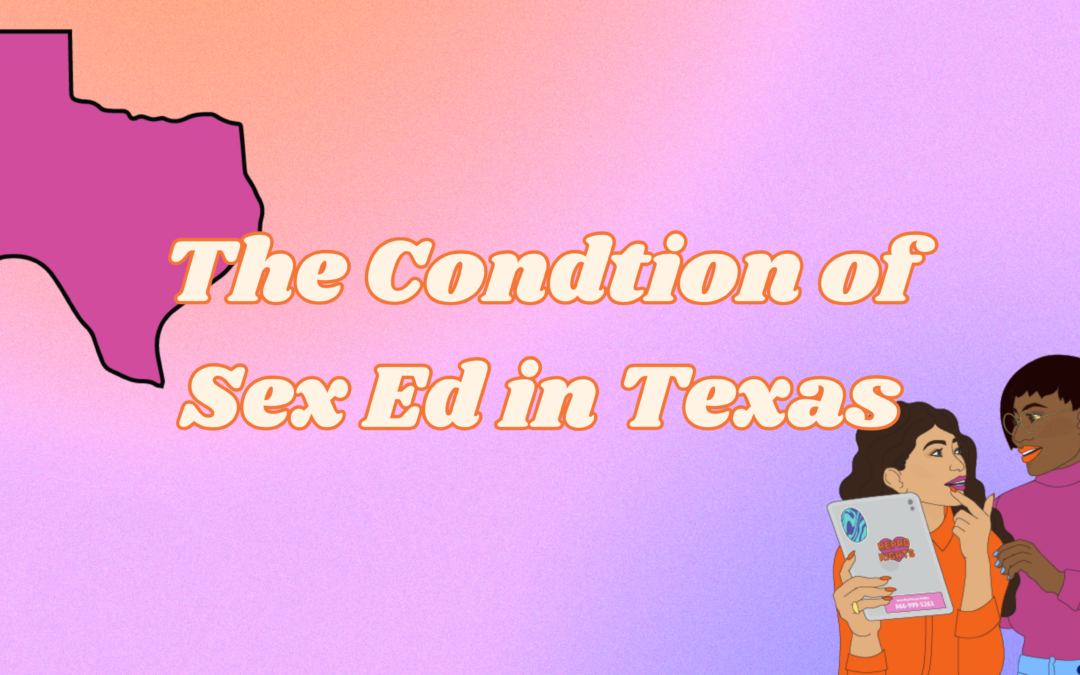This blog was written by a member of our 2024 Youth Content Squad.
After being assigned to watch John Oliver’s segment on sex education for a human sexuality course in college, I reflected on my own experience with sex ed. Growing up, sex was never discussed at all in my schools or at home. I began asking others in my community about their experiences with sex ed, and just like me – sex ed wasn’t taught at the middle or high school level at all. This was the most common answer I received – no form of sex ed at all.
I did learn that when it was taught, the majority of people did not find the information useful. They were shown pictures of symptoms of STIs and given brief overviews of topics as complex as puberty. People also had harmful stories, such as an educator pushing for girls to never be sexually active and shaming pregnant students. It was rare to find individuals with good experiences; in fact, there was only one notable story where someone shared that his sex ed included a video of a woman giving birth, which opened his mind to how “real” giving birth is and sympathize with those who go through it.
There are a variety of experiences when it comes to sex ed, but there is one major takeaway from these stories: Texas lacks proper sex education for young people.
Texas Laws on Sex Education
Deciding how sex education will be taught is based on the decision-makers at the state and local levels – there are no federal guidelines that must be followed. Therefore, the laws and regulations vary by location. Texas laws about sex ed highlight one idea that is mandatory to enforce, if sex ed is decided to be taught – the curriculum must emphasize abstinence. Even when discussing anatomy, contraception, and STI prevention, abstinence must be included in these conversations, pushing abstinence as the only answer. Other aspects of regulation play into the disappointing state of sex ed in Texas such as an ability for parents to “opt” out, no requirement to educate on consent, and no discussion of LGBTQ+ people at all.
Abstinence as Sex Education
With abstinence being the enforced curriculum, it is important to understand what abstinence is. Abstinence is the practice of restraining from something. In this scenario, they are teaching students to refrain from having sex. Abstinence isn’t bad to partake in – when it’s a personal preference and choice. However, enforcing abstinence as sex education can cause issues as young people explore their sexual expression.
Texas tells teachers to teach students that by not having sex at all, they could “avoid” pregnancy and sexually transmitted infections, but the state doesn’t regulate how teachers do this. This is a problem. Damaging religious or sexist beliefs can often negatively affect a student – statements such as “God says…” or “Women should…” can bring shame and guilt to LGBTQ+ students and women.
The laws also state that there should be no “promotion of homosexuality”, therefore, unless queer people are being used as a fear tactic, such as with HIV and AIDS topics, LGBTQ+ people are not discussed at all. While the sex education that is being taught is already unpleasant, it only paints a picture of sex one way: through a man and a woman. We see a complete disregard for LGBTQ+ people. Not only are LGBTQ+ students not being given education about how to interact with sexuality, but their identities are completely ignored and discussions about gender identity and sexual orientation are being made to be against the law. With many anti-transgender legislation actively being passed, there is more room for misrepresentation of LGBTQ+ people and more pushback against their identities. Therefore, not only are young people being shamed for possibly having sex unmarried one day, but also being shamed for being a woman, or being LGBTQ+.
Texas’s current sex-ed guidelines are causing guilt and shame for teens across the state. To tell individuals that they shouldn’t be having sex teaches them that sex is “wrong”, and if they do it, they’re “bad” or will get in trouble. Making young people afraid of sex doesn’t stop them from having it, instead, it creates a distrust in talking about sex, withholds them from asking helpful questions, and encourages shame within them and their curiosity.
Similarly, the focus on abstinence doesn’t allow room for explanation. Saying the only right answer is to not have sex leads to a lack of explanation of critical sex-ed topics like how pregnancy works, how sexually transmitted infections spread, or how to have safe sex when ready. Young people can’t even ask questions because they may feel guilty and were never given the resources to know what to ask in the first place.
Without Sex Education
There are obvious issues with how sex ed is taught in Texas schools, but without it, trial and error is how most young people will get their knowledge of sex. Rather than teaching them how to prevent unwanted pregnancies, STIs, or uncomfortable sexual situations beforehand, the lack of education forces them to learn through experiencing them.
Young people without proper sex education go into sexual exploration with a larger risk of accidents and events they were never prepared to go through. Having poor or no sex education at all puts young people at a disadvantage for expressing their sexuality safely.
Some people propose that sexual education shouldn’t even be taught in schools because they believe it can and should be taught at home. However, this belief assumes that every household will have this conversation and that simply isn’t the case. Some parents may not have the language or can feel too awkward and believe that by never speaking about it, their offspring will never have sex – which puts young people at unequal levels of understanding.
As young people navigate their curiosity and feelings, some will have a disadvantage with their lack of knowledge. Requiring sex ed in schools puts everyone at a similar understanding of sexuality.
Hope for the Future of Sex Education
While the laws in Texas protecting sexuality, such as reproductive rights, sexual education, LGBTQ+ rights, etc are under constant attack, we are not doomed.
The first step to achieving better sex education for our youth and the generations to come is using the resources that already exist. Many organizations and communities have been built for the sake of having useful information that is easily accessible to young people. The Scarleteen website (www.https://www.scarleteen.com) is a very welcoming website that has a lot of information regarding all aspects of sex, such as answering questions and giving advice regarding bodies, sexual health, pregnancy, abuse, and sexual politics just to name a few. Jane’s Due Process even has its own system (https://janesdueprocess.org/jdp-sex-talk/) where you can ask any question regarding sexuality and a JDP sexpert can give you a direct answer. As you begin to grow curious, these safe spaces have been created for asking questions without fear or shame.
If you want something more local and inclusive, you could always turn to the social media accounts of your closest Title X clinic, Texas abortion fund, and any other pro-choice and LGBTQ+ organization that specializes in healthcare.
As knowledge is being built, the next step is building community. Feeling confident in your knowledge about sex is important because you can share information and resources with friends and people close to you who may not know about safe sex, consent, or healthy relationships. You can help in building a self-aware community.
Through that community, you could advocate for better sex education. Many organizations already exist with proper sex ed as the main goal, such as the Sexuality Information and Education Council of the United States (SIECUS) and Advocates for Youth. You can use your voice and resources to expand their goals even more, and especially to your community.
Properly learning about sex education should be like learning algebra or chemistry – required of the curriculum and something young people are expected to learn about during their school years. As young people begin to become aware of the lack of respect Texas politicians often have for their right to safe sexual activity, there is growth and the ability to change. Young people deserve better than fear and misinformation – they deserve to feel validated in their curiosity and it should be demanded that they are prepared for these experiences.




